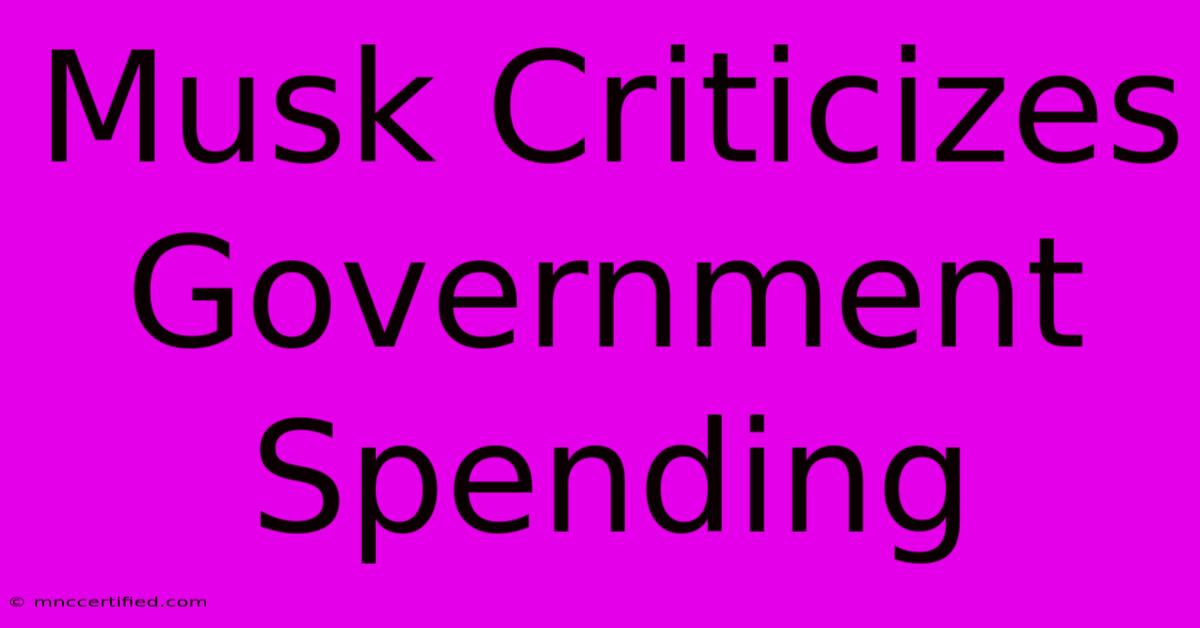Musk Criticizes Government Spending

Table of Contents
Musk Criticizes Government Spending: A Deep Dive into Elon Musk's Fiscal Concerns
Elon Musk, the visionary behind Tesla and SpaceX, is known for his outspoken views on a wide range of topics. One recurring theme in his public pronouncements is his sharp criticism of government spending. This article delves into Musk's criticisms, examining the specific areas he targets, the reasoning behind his concerns, and the broader implications of his stance.
Targeting Inefficiencies and Wasteful Spending
Musk frequently highlights what he perceives as inefficient government spending. He doesn't shy away from criticizing specific programs, often pointing to instances of bureaucratic bloat and a lack of accountability. He argues that taxpayer money is often misallocated, resulting in projects that deliver little value or fail to achieve their stated goals. This criticism extends across various sectors, including:
Infrastructure Projects: A Case Study
Musk often uses infrastructure projects as an example of wasteful government spending. He argues that many projects are plagued by delays, cost overruns, and a lack of innovation. He advocates for a more streamlined and efficient approach to infrastructure development, emphasizing the potential for private sector involvement to improve outcomes and reduce costs. He often contrasts government-led projects with the speed and efficiency demonstrated by his own companies in developing innovative technologies.
Subsidies and Bailouts: Unnecessary Intervention?
Musk's critique also encompasses government subsidies and bailouts. He argues that these interventions can distort markets, create moral hazard, and ultimately harm the economy in the long run. He believes that the free market should be allowed to operate more freely, with minimal government interference, to promote innovation and efficiency. He often suggests that companies should stand or fall based on their own merits, rather than relying on government support.
The Underlying Principles: Musk's Fiscal Philosophy
Musk's criticisms stem from a strong belief in fiscal responsibility and limited government. He advocates for a smaller government footprint, arguing that excessive spending crowds out private investment, stifles innovation, and ultimately harms economic growth. His perspective aligns with certain libertarian and free-market principles, emphasizing individual liberty and the power of competition.
Emphasis on Efficiency and Productivity
Underlying Musk's criticisms is a strong emphasis on efficiency and productivity. He often highlights the importance of optimizing processes and eliminating waste, both in the private and public sectors. This focus reflects his own managerial style, which emphasizes rapid iteration, data-driven decision-making, and a relentless pursuit of improvement.
The Importance of Long-Term Vision
Musk's criticisms are not solely focused on short-term budgetary concerns. He often emphasizes the importance of long-term vision and strategic planning in government spending. He argues that short-sighted decisions, driven by political expediency, can lead to costly mistakes that have lasting consequences.
The Broader Implications and Ongoing Debate
Musk's outspoken criticism of government spending has sparked considerable debate. While some agree with his assessment of inefficiencies and the need for fiscal responsibility, others argue that his views are overly simplistic and fail to account for the complex challenges facing governments. The debate highlights the ongoing tension between the desire for efficient government and the need for public services.
The Role of Private Sector Participation
Musk's advocacy for increased private sector involvement in public projects remains a key point of contention. Some argue that this approach could lead to privatization of essential services and exacerbate inequalities, while others believe it can foster innovation and efficiency.
The Balancing Act: Public Good vs. Fiscal Prudence
Ultimately, the debate around Musk's criticisms boils down to a fundamental question: how to balance the need for essential public services with the goal of fiscal prudence. Finding this balance is a complex challenge that requires careful consideration of competing priorities and a nuanced understanding of economic realities.
Keywords: Elon Musk, government spending, fiscal responsibility, infrastructure, subsidies, bailouts, libertarian, free market, efficiency, productivity, economic growth, public services, private sector, innovation, wasteful spending, criticism, debate.

Thank you for visiting our website wich cover about Musk Criticizes Government Spending. We hope the information provided has been useful to you. Feel free to contact us if you have any questions or need further assistance. See you next time and dont miss to bookmark.
Featured Posts
-
Musk Criticizes Government Spending
Dec 19, 2024
-
Matilda Djerf Apologizes After Report
Dec 19, 2024
-
Wrights Hilarious Trouble Comment
Dec 19, 2024
-
Fed Cuts Rates Again Main Points
Dec 19, 2024
-
Arsenal Vs Crystal Palace Livestream
Dec 19, 2024